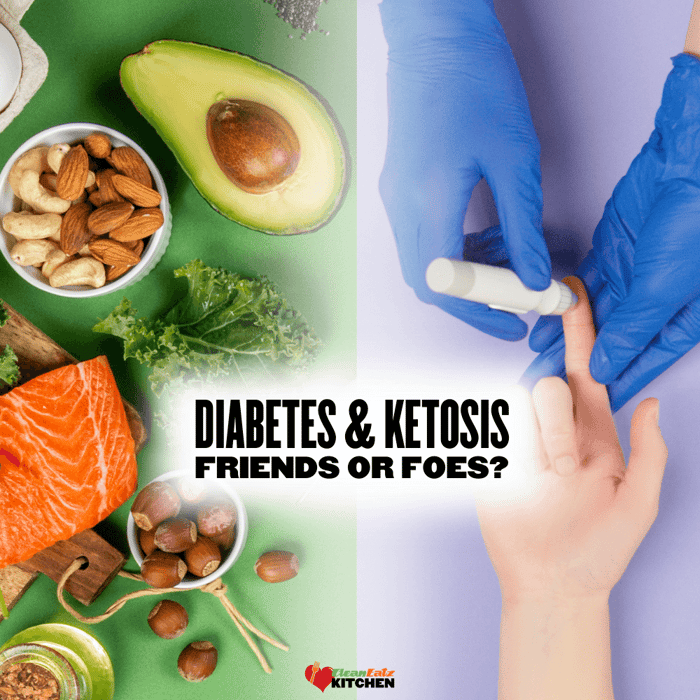
Keto Diet for Diabetics: Friends or Foes?
Jason Nista
Nutrition
|
Healthy Lifestyle
11 minute read
A Keto meal delivery plan has definitely become a mainstream topic in the health and fitness industry with many claims of fat loss, managing triglycerides, and cholesterol, regulating appetite, and even managing glucose levels, improving insulin sensitivity, and thus helping people with diabetes better manage their health condition. Today we’ll look at this topic through the lens of this specific population: people with diabetes and if the Keto diet for diabetics can help them manage their disease and if it's safe in the long run.
What is the Keto Diet?
The "keto diet and diabetes" management has been gaining traction in recent years due to its high-fat, low-carbohydrate approach. This dietary plan operates by compelling your body to burn fat for energy, a contrast to its usual reliance on carbohydrates. Such a shift can alleviate insulin resistance and enhance blood sugar regulation, leading to a notable decrease in A1C levels in those with type 2 diabetes.
Adhering to the "keto diet and diabetes" approach involves a significant reduction in carbohydrate consumption, which is replaced with dietary fats. This dietary adjustment pushes your body into a state known as ketosis, during which it begins to use fat as its primary energy source instead of glucose from carbohydrates. As a result, weight loss can occur and the body's efficiency at utilizing fats for energy improves. Hence, it raises the question - "Is keto good for type 2 diabetes?" This diet's potential benefits in blood sugar control and weight management suggest it could be a viable option for individuals with type 2 diabetes.
What Is Type 2 Diabetes?
Type 2 diabetes, a chronic health condition, develops when insulin resistance occurs in the body's cells or when the pancreas falls short in producing enough insulin. Keto diet and diabetes management are closely interlinked, as this can lead to unregulated blood sugar levels, escalating health risks such as heart disease, stroke, and vision loss.
Typically, the management of type 2 diabetes involves lifestyle modifications, like regular physical activity, adherence to a balanced diet, and maintaining a healthy weight. A popular question arises, "Is keto good for type 2 diabetes?" To answer, the keto diet can indeed play a significant role in these lifestyle changes and may also be used as a tool to help maintain control over glucose levels.
However, finding the right balance can be a challenge, and medications may be required in conjunction with the keto diet for optimal diabetes management. Despite these challenges, with the right treatment approach that includes a keto diet and proper diabetes management, individuals can continue to lead an active life while keeping the associated risks of this chronic condition at a minimum.
Proven Benefits of Keto Diet for Diabetics
The keto diet appears to have beneficial effects on type 2 diabetes, which is characterized by high blood sugar and insulin resistance. These chronic high blood sugar levels can damage healthy cells, including nerves, the retina of the eyes, the kidneys, and others.
There are some proven benefits of a keto diet that can help people with diabetes manage their condition and prevent other associated health concerns like obesity, high cholesterol and triglycerides, high blood pressure, and others. By helping decrease triglyceride levels in the blood, control blood glucose levels and fasting glucose, and regulate appetite and overall caloric intake a keto diet helps with weight management and fat loss.
In addition, starting this diet and sticking to it has been proven to lower hemoglobin A1c (a marker of average blood sugar levels) in people with type 2 diabetes and those with metabolic disease.
Controlling Blood Sugar Levels
The keto diet and diabetes have a significant link. This low-carb, high-fat diet prompts your body to burn fat rather than carbohydrates for energy. The process leads your body into a state called "ketosis," where fat, instead of glucose, becomes the primary energy source.
The question, "Is keto good for type 2 diabetes?" often arises because lowering glucose levels in the bloodstream aids in better management of blood sugar levels, often resulting in enhanced A1C scores, which are a measure of long-term blood sugar control. Moreover, the keto diet and diabetes management are further linked as this diet also decreases levels of triglycerides (a type of fat found in your blood) and boosts levels of HDL (or "good") cholesterol.
Weight Loss
For individuals grappling with obesity or overweight challenges, the keto diet and diabetes have a notable correlation. The keto regimen can contribute to considerable weight reduction. However, confining your daily carbohydrate consumption to merely 5–10% of your total caloric intake places your body into a caloric deficit – indicating that you will burn more calories than you consume over time.
This caloric deficit can result in substantial weight loss – a phenomenon associated with enhanced glycemic control and diminished risk factors for heart disease and stroke in people with type 2 diabetes. Consequently, the question 'is keto good for type 2 diabetes' can be affirmatively answered. Additionally, Clean Eatz Kitchen offers weight loss meal delivery that complements the keto diet and diabetes management.
Improved Cognitive Function
Research suggests that the keto diet and diabetes management can have a positive correlation, especially regarding cognitive function in individuals with type 2 diabetes. Investigations indicate that a low-carbohydrate regimen, like the keto diet, may enhance mental sharpness and concentration by maintaining balanced glucose levels and mitigating inflammation in the brain. These are both crucial elements when it comes to managing the cognitive deterioration often associated with aging and type 2 diabetes. Therefore, addressing the question, "Is keto good for type 2 diabetes?", these studies seem to indicate a beneficial connection.
Here are some of the benefits that diabetics may find from following a ketogenic diet:
- Improved glycemic (or blood sugar) control
- Lower triglycerides
- Improved insulin resistance
- It may reduce the need for insulin
However, it's important to note that the ketogenic diet isn't suitable for everyone with type 2 diabetes. It may not be safe for those taking certain medications or having other health conditions, such as kidney disease or pancreatitis. Before starting any new dietary approach, it's essential to speak with your doctor first to make sure it's right for you. Clean Eatz Kitchen is a healthy meal delivery service with many options including a Keto meal delivery plan.
Conducted Studies
A 24-week study in 2008 showed that patients with type 2 diabetes and obesity who followed the ketogenic diet saw greater improvements in glycemic control and reduced medication compared to those who followed the strict diets.
One study comparing the effects of a keto diet and a regular balanced diet in people with type 2 diabetes found that both groups experienced reductions in body weight, BMI, waist circumference, triglycerides, total cholesterol, LDL, HDL, fasting blood glucose, fasting insulin, and HbA1C; but the ketogenic diet improved metabolic markers more than the isocaloric control diet.
However, most of the participants reported that they wouldn’t be able to adhere to the ketogenic diet in the long run. This is quite important because adherence to the protocol and sustainability should be one marker of it being effective, otherwise, the benefits will not be long-term and consistent and will be associated with the inherent health risks of a strict diet protocol like Keto.
Health Concerns and Safety
There are some important safety concerns that should be taken into consideration since this approach is a very restrictive diet that eliminates a whole macronutrient almost entirely, or to a very low daily level, achieved through a highly restrictive sugar free diet of under 50 grams per day of carbohydrates. This not only makes the diet hard to follow for some people but also carries the following cautions:
- If not monitored by a professional the keto diet can result in an increase in cholesterol and LDL (the bad one), due to poor meal choices, reduced fiber intake, or an increased caloric intake.
- As mentioned before adherence to the program can be difficult due to the restrictive nature and some unpleasant side effects like nausea, constipation, and vomiting; low energy levels, bad moods, nutrient deficiencies, and others.
- People with diabetes are already at risk of developing Ketoacidosis which is a dangerous and potentially lethal condition, A nutritional-induced state of ketosis can potentially lead to euglycemic ketoacidosis (with normal blood glucose levels) if not monitored appropriately.
- The diet might help regulate your blood glucose levels and lower A1c levels, but that may mean you’re at a higher risk of your blood sugar going too far low especially if you’re already taking medication for your diabetes.
- There is research showing that ketone bodies in the blood might be able to cause vascular damage similar to high glucose levels. This is particularly dangerous to patients who already have some form of high blood pressure, vascular and coagulation affections, or heart disease.
So a keto diet meal plan delivery is something that people with diabetes should look into and not try to figure out all by themselves.
Why Monitoring Your Keto Glucose Levels is Beneficial
Tracking your keto glucose levels offers insights into your insulin resistance level. This is especially relevant for those on a keto diet aiming to burn fat instead of carbs.
If your keto glucose levels are elevated, it might suggest that your body isn't generating adequate insulin, or there could be other underlying reasons. Therefore, discussing any fluctuations in your keto glucose levels with your doctor when on a keto diet is of utmost importance. Consistent monitoring is the key!
Moreover, keeping a close watch on your keto glucose levels lets you discern how various foods influence your body and its ability to burn fat over carbs. Armed with this knowledge, you can then tailor your diet to what aligns best with your objectives and "what should my blood glucose be on keto for optimal health.
How To Monitor Keto Glucose Levels
Monitoring keto glucose levels, specifically your fasting blood sugar, isn't complex. However, accuracy is paramount, so consider the following steps:
- Fast Overnight: Refrain from eating 12 hours before your test.
- Morning Test: It's crucial to test first thing in the morning for the most reliable results.
- Avoid Water Before Testing: Water intake can skew the results.
- Skip Pre-test Exercise: Physical activity can change your readings.
- Maintain a Record: Logging all test outcomes helps in tracking your progress and detecting potential issues.
Consistent tracking of keto glucose levels is pivotal for the success of the keto diet. One reliable method: a glucose monitor. Using a lancet, the monitor extracts a tiny drop of blood from your fingertip. While mostly painless and quick, applying this blood drop to the glucose meter's test strip yields your reading.
Main Takeaways
This is definitely a delicate topic that doesn’t have a definitive answer and is highly dependent on every individual cause. However, there are a few guidelines that you should consider if you have diabetes and are interested in using a keto diet as part of your arsenal to manage your conditioning:
- It is extremely important to consult your doctor before starting a new nutritional regime, even more so with a delicate intervention like the Keto diet for a chronic condition like diabetes.
- If you and your doctor decide together to give it a try, seek the help of a professional in nutrition and keto for your specific population to be as safe as possible and get continuous feedback and monitoring.
- Maintain an objective view when reviewing your logos and the results you’re getting and be prepared to move on if you’re not getting what you were looking for or you are experiencing unwanted side effects.
FAQ
Can everybody do a Keto diet?
If you have conditions involving your liver or gallbladder keto diet is probably not something you should try.
Will keto raise my blood sugar?
Keto actually helps to lower insulin levels.
When should I stop a keto diet?
As soon as you feel any side effects kicking in but for most diabetics, the keto diet doesn't do any harm.
What are the first side effects of the keto diet if the body rejects it?
You'll start feeling nauseous, exhausted and might start having problems with sleep.
Related Articles
Is Honey Good for Weight Loss?
7 minute read
Turmeric for Weight Loss
7 minute read
When is the Best Time to Workout?
5 minute read



